
A film script became a drama that works
Initially I dropped this show but came back to it later, and I’m glad I did. There’s a lot that could be better about it, but the heart of it is very good. What interested me was that a film writer (Yoo Young Ah), wrote a drama that filled 16 hours with a plot that could have serviced a two hour movie, and managed to pull it off.Movies, like short stories, revolve around one basic idea. To try and do more is actually to do less because you don’t have the space to properly explore them. So, here she takes the basic noona/chaebol romance, stripped of any excess emphasis on politics, secondary romances, plot twists (the normal complexities written into long dramas) and plumbs the depth of it. Although I don’t think the characters had enough shade written into them to give them the full three dimensions, Park Bo Gum acted his heart out and gave a a really convincing performance, particularly towards the end.
I doubt there’s anything more than that comment, insightful enough to add anything to the already abundant comments in other reviews.
What my rating means: 8+ A great drama with interesting content and good writing, direction, acting, OST, cinematography. But didn’t quite have the requisite sparkle to bump it into my all-time fave list. Worth watching.
Was this review helpful to you?
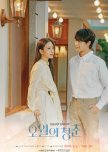
A lot to like, but flawed delivery
Essentially this is a love story set against the background of the Gwangju Uprising. It is not so much about the politics but rather a serious piece of social commentary that explores the impact on the people involved. There is a lot to like about this production that carries you through the flaws in the plotting, writing, staging and direction.The story centres around coercion on multiple levels: personal, family, business and political. We all make choices in life that reflect our response to current circumstances and when those circumstances turn increasingly oppressive the trigger point for each individual is different. Although our choices are our own to make, what we decide to do will impact those around us. At what point does the greater good triumph over family responsibilities? What is the cost to the individual if they choose family? What is the fallout if they choose the greater good? What is the tipping point, if there is one, to change from one to the other?
The drama sets up a number of scenarios to explore these dilemmas: from the nurse who has been impacted by her father’s decisions, to the student who chooses action regardless of family. The drama illustrates the human and emotional costs involved and shows that social change is only possible through the sacrifice of not only innocence but also the innocent.
The pluses of this drama are the performances, not just by the leads, Lee Do Hyun and Go Min Si, but also some of the supporting cast. Oh Man Suk was excellent as Hwang Ki Nam and had a very credible ruthlessness. Lee Sang Yi as Lee Soo Chan made a memorable impression as a good man forced to recognise and embrace reality. The lovers had a beautiful and believable chemistry and that made it easy to go along with their instant love.
There are also some very good character development arcs, as various characters get to grips with these issues. For me Lee Soo Chan, who is memorably played by Lee Sang Yi, is the best illustration of wilful ignorance to action. But others in the story are forced to come to terms with themselves in less favourable lights. There is a sense that we all would hope to be a hero, but the show reveals the courage needed just to survive, let alone take action, and does it with a certain amount of compassion.
Although the concepts within the drama are well thought through and delivered by the writer, Lee Kang, the actual structure and plotting is not always good. There are many times, particularly with the leads, where motivations are forced, or jarringly out of character, in order to serve the purposes of the plot.
The direction did little to help the lacklustre tension and was far too static and slow. It was in the mode of a romance which means it failed to do justice to the dynamics of the setting, which was in the middle of an uprising. At times we needed to see more anxiety and less stoicism. There needed to be more frequent and more marked changes of pace. This was partly the script but the greater responsibility lay with the director and how the scenes were played out and edited. Passages of dialogue in dire situations were delivered in calm measured ways, instead of urgent, desperate whispers. The editing interrupted impending threat by giving the actors all the time in the world to be romantic. It also often jumped erratically between the different scenarios leaking tension like a sponge, rather than building it in layers.
Overall, this is a good drama and well worth watching if you are prepared for patches of frustration along the way. It provides good food for thought and reveals multiple perspectives to reflect on.
What my rating means: 8+ A great drama with interesting content and good writing, direction, acting, OST, cinematography. But didn’t quite have the requisite sparkle to bump it into my all-time fave list. Worth watching.
Was this review helpful to you?

A promising fledgling trapped in a cage of romance tropes.
This drama was a pleasant surprise that exceeded my admittedly low expectations. There was a straightforwardness and believability about the writing, and the delivery of the lines by the central leads, Im Si Won and Shin Se Kyung, that enhanced the reality of the story. The attitude of the FL was credible given her background. She was written with some depth to her, unusual in romance dramas. The pressures and considerations around her profession as a translator were well illustrated and interesting. I must admit that I’m pretty hopeless at learning languages but I do have an appreciation of how a language shapes your world. After all, you can only know that you experience things that you have words for.The serious nature of the topic under discussion at the start was well treated, with echoes of DP, another drama that explores institutionalised bullying. The ML had some of the expected personality traits: cold, unresponsive etc, but he was given a credible reason for them in his background. The drama did a reasonable job of showing us the steps of his transformation without completely turning our frog into a prince charming.
The characters of the leads were non-standard for romance and they were well fleshed out and believable. With two unconventional and interesting leads one wonders whether it was necessary to have such a prominent secondary couple. The mood of the drama was more akin to “I’ll see you when the weather is fine” or “Just between lovers”, both of which emphasised the primary romance, with less than usual time given to the secondary one. We really needed to spend more time with our main couple to understand the subtleties of their interactions with each other. Sometimes the time lines were twisted and there was an inexplicable reaction happening before the motivation that explained it, which was confusing and unnecessary.
According to kdrama tweets on Twitter, (https://twitter.com/iconickdramas/status/1347390682848129025?lang=en) this is Park Shi Hyun’s first outing as a lead writer, having been an assistant writer to Kim Eun Sook who wrote “Goblin”, “Descendants of the Sun” and “Mr Sunshine”. If this is the case, Park is definitely to be commended and encouraged because it shows promise and it’s faults can at least be understood if not forgiven.
Having mentioned faults, let’s go there and explore them. I think that one source of the problem as far as I’m concerned was trying to fit a non-standard romance into a standard formula with a standard treatment. In the process the subtlety was trashed and a great deal was lost in translation. The natural flow of the story seemed to be forced in some places and stifled in others by the rigid application of standard romance tropes and editing choices. The relationship between the two leads was forced. The writer hardly gave it time to develop before pulling it apart on cue which seemed totally inappropriate for this drama. As far as I’m concerned, in order to reveal the natural development of the characters it needed it’s own non-standard form. In particular, the episodes around two thirds of the way through lacked character integrity for me.
Unfortunately we were treated to the tedious long frozen gazes that seem to plague romance dramas. Sorry, but I’m so over that style of directing and editing. I find it unnatural, weird and incredibly dated. You know that very soon it will identify an era that was very OTT and laughable. In fact it seems like that to me right now. I imagine that it is all about live broadcasting, allowing viewers to have long lingering hot-shots of their favourite crushes. But this was a Netflix series, watched on-line where you can freeze the frame yourself and gush in the privacy of your own bedroom (or whatever you want to do…). So why?
I felt that Park Shi Hyun wanted to write something different and was being constrained by outside forces to conform to a norm. The result was a strangely unsettling experience full of cliched romance production values and lip bump kisses. It really had the potential to be so much better than that.
What my rating means: 6+ Some aspects of it were OK but it had serious flaws. It will pass the time but you can find something better.
Was this review helpful to you?
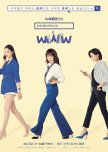
It’s all in the editing…
The overall harmony required to make a stunning drama rather than a great drama is all about balance, where nothing dominates. Each aspect works with the others, so that everything blends together into a seamless whole. The final cut of this drama felt like individual soloists in a group competing for attention. The quality of the writing, cinematography, directing and acting was all really excellent, but the editing lacked the requisite harmony and balance to create a seamless, sumptuous experience. Too often, the script and actors played second fiddle to the cinematography.The cinematography in this production was admittedly stunning but way too prominent, particularly in the early episodes. So frequent are the carefully framed and composed long shots that it becomes overly self conscious. While I want to commend the striking and beautiful set shots, they caught my attention with such an impact that they drew me out of the story. This is fine occasionally, but when it is every few minutes, it’s too much. I am watching a drama, not wondering through a photography exhibition.
There was a lot of hand held camera work, close ups, tilted frames and unusual angles which followed each other in rapid succession. As though the cinematographer was trying to push every possible ounce of novelty into the available space. I’m wondering if the editing suite was then provided with a wealth of material that may not have included enough straightforward shots to edit the scene without employing a superfluity of fast cuts. Okay, I’m being generous here, it was deliberate.
Often, in dialogues between two people, the shots continuously cut between them so that you didn’t get a sense of conversation. Admittedly, it could be symbolism for some non-communication happening, but to be honest, it intruded into the flow of the dialogue to such an extent that the actors and the words seemed to be battling for attention and the meaning was lost. It had the effect of keeping the viewer at a distance, watching what was happening as an observer, rather than being drawn in.
There was extensive playing around with depth of field which created some nice effects and the out-of-focus areas added to the texture which is normally the job of lighting. Frequently the visible area of focus was greatly reduced by including blurred pillars and walls in the frame. Shot mainly in warm tones with plenty of colour in the sets and costumes the overall feel of the production was vibrant and dynamic. A good contrast was achieved between the appearance of the two companies, Barro which was assigned golds through orange to brown and Unicon in cooler blues through green, which went a long way to setting up the tension and defining their differences in approach and character.
Overall, although I welcome and thoroughly enjoy good cinematography (and there was bucketloads of that) there is a balance to be struck between all the aspects of storytelling if a drama is going to be successful at engaging its audience. Although it calmed down towards the end of the drama, the beginning was way over the top. Here it is notable that despite the imbalances, the drama was still powerful and I put that down to the scriptwriter, Kwon Do Eun.
The script is crisp, clever, intelligent and often witty (even in translation) and contained three beautifully realised and different relationships. Scarlet’s followed the norms for romance and was cute, easy and relatable, but I found much more to interest me in the other two, more mature relationships. Song Ga-Gyeong’s partnership with her husband was the most moving for me, with a poignant performance by Jo Seung Hyun as Oh Jin Woo. I really like him as an actor in general and in this performance he did a great job of conveying the inner world below the dignified surface.
The dialogue between Bae Ta Mi and Park Morgan was fresh, original and well executed and it provided the core of the romance aspects of the story. The demands that Park Morgan makes on Bae Ta Mi and the constraints he puts himself under, as well as the compromises he makes, present wonderful opportunities for building the tension (both sexual and otherwise) between them and I enjoyed their interactions and flirtations. The progression of their relationship was not, in my opinion, created by the writer for plot convenience, but represented believable aspects of their characters and reflected the real difference in their ages and dreams.
The heart of this story though, was the exploration of the relationship between three powerful and strong women and the three actors playing them gave excellent performances. If you need to thoroughly like your heroines then this is not the drama for you. With the exception perhaps of Scarlet, who is a lightweight in comparison, the other two present the ruthlessness which they had to have in order to survive and thrive. And it’s not always pretty. But that provides the interest and character development in the story and what makes it a compelling drama. The various ethical dilemmas raised in the plot serve to test both their characters and their humanity.
Much of the plot is episodic and revolves around moral issues regarding personal information and privacy. It does a good job of giving the facts in fairly credible conversations and highlights the core problems and political pressures in the internet business world. It explores the implications of the totally connected society that we live in and highlights the shifting sands of rights and responsibilities. It’s a good show to watch if you want to be stimulated to think.
The soundtrack uses of a lot of music familiar to western ears, from jazz to classical as well as some original material. In a show bursting with strong production values, this was its weakest point. There was some good stuff in the mix but not original enough to strike my ear and hold my attention.
This show isn’t about nice neat solutions, it’s about incompatible dreams and principles and ethically messy grey areas, so expect to be conflicted.
What my rating means: 8+ A great drama with interesting content and good writing, direction, acting, OST, cinematography. But didn’t quite have the requisite sparkle to bump it into my all-time fave list. Worth watching.
Was this review helpful to you?
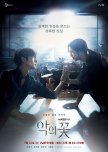
Never mind the plot, feel the production values…
There’s a ton of reviews for this show, so I don’t want to write another - wow, amazing, watch-this-show review. With that in mind I’m going to focus on the direction and production values, because they are totally awesome. If you have not already seen this show, widen your eyes and ears when you watch it. If you are re-watching, hopefully you will have enough spare capacity to take more notice of some of the stuff I’m going to talk about.In a drama like this, where the plot is complex and there are a lot of characters with conflicting motivations, first time round it was as much as I could do to just keep up and I popped out at the other end wondering why I found this show soooo amazing. Because let’s face it, the plot is not brilliant. Yes it’s got some great twists and continually finds inventive ways to keep the tension going, but it’s horribly clichéd and frequently stretches credulity like knicker elastic. Sometimes I found myself laughing when I should have been chewing my nails—not good. Whilst I was busy following the plot and being mesmerised by LJG,'s performance, all the production values were impacting me at a subliminal level creating the context for the story to come alive. I may not have always directly noticed it, but if they weren’t there, to be honest, I’d have been watching an average thriller. So I’m still going to give this show a 9 because everything but the plot is exceptional.
Let’s start with the directing. I loved the innovative way in which Kim Chul Gyu gave the viewer insight into Do Hyeon Su and elicited our empathy for him. This take on psychopathy is pretty unique and none of the usual things are going to work here. I can imagine that a lot of time and thought went into working out a way to do it. And in the end it was brilliantly achieved through close-up camera work, subtle facial movements (LJG was simply awesome here); slow motion and lack of normalising sound. Without these techniques, Do Hyeon Su would have been just another closed up, leading male and it would be difficult to credit why Chae Ji Won loved him. Kim Chul Gyu enabled the viewer to get inside Hyeon Su’s head. Sometimes, in those extreme close-ups, you could actually see LJG’s thought processes going on behind his eyes. And the sequences, particularly in the first couple of episodes, were cleverly designed to show cause and effect. In Ep 4, first date, we are encouraged to see Ji Won through Hyeon Su’s eyes, by utilising slow motion for her face and turning up the soundtrack, so that as viewers we were forced to register her facial expressions in a way that we normally wouldn’t. The effect was to share the process with Hyeon Su of working out what she was feeling and responding in kind. Brilliant!
The constraints of the plot early on worked well to curb the release of emotions and increase their intensity. This underplaying is magic and such an achievement can only be realised when a great director works in total harmony with capable actors. I don’t need to say much about the career-highlight portrayals by Lee Joon Gi and Moon Chae Won, just read other reviews for that. However, when the constraints of the plot are lifted about two thirds of the way through, imo things get a bit out of hand and there is a bucketful of crying, which is a pity. I’m such a great believer in less is so very much more. LJG has said in interviews that he felt that the melo took over at the end and the impression I got was that he wished they’d pulled it back a bit. I must admit that the whole portrayal of the antagonist Baek Hee Sung was simply too OTT for me. And the scenes involving the Baek family were the least convincing in the drama.
Moving on to the cinematography. Park Seong Yong has been involved in a string of smash hits, and that can’t be accidental or just luck. There is no doubt that he has played a part in their success. In Flower of Evil he relies heavily on photographic composition. In the first two thirds of the drama he frequently lingers on beautifully composed set shots that are lit and framed to perfection. There is a scene in Ep 8 between Hyeon Su and Hae Su set in a derelict indoor fishing facility with extensive walls of now broken glass. The scene, at night, is lit primarily from one bright, gold light-source set externally. It creates a breathtaking atmospheric beauty for this very moving scene. I mean, who would have thought to do that? Wow! And that is just one example of a thread of innovative and exquisite shots that meander like a necklace of pearls through all the earlier episodes.
The richness of the colour palette is another gem in this production. The whisky bar in Ep 9 utilises deep reds and gold, in a set that glories in chiaroscuro: hidden motives and black deeds hide in the shadows. Scenes where we see the calculating side of Hyeon Su are often filmed in blue-tinged lighting, emphasising the hard lines of the faces and bringing a sharp coldness to the overall mood.
The cinematography everywhere enhances and reveals the emotional impact of the action. The phone conversation at 10pm in Episode 10 is a beautiful example of this. When after a deeply difficult and moving scene there is a static long-shot of Ji Won alone on the wide, bare expanse of the office rooftop, with a blurred backdrop of skyscraper lights: so very small and alone with all her desperate feelings.
Throughout, the lighting echoes one of the themes of the drama; that light can be born from darkness. The overall tone of the production is shadowed, with frequent highlights of warm tones, even occasionally used for the antagonists.
The soundtrack is a masterpiece of creativity as well. Not smoothed to the point of blandness, it has a gritty, exposed texture. It reflects the dichotomy of the story from the pulsing beat and rising scale of “Psycho” to the unforgettable, haunting falsetto of “Feel You”. Often, the string section in contemporary film and game music is used for hackneyed, swelling melodies and I loved that the titles music utilised slightly grating arpeggios from the strings and layered soaring voices above them.
Overall, even with all its faults, Flower of Evil is an unique drama that offers up a feast for the eyes and ears as well as some really notable performances from all of the leads. Lee Joon Gi was beyond good and his performance alone is enough to recommend this show.
What my rating means: 9+ A drama I totally fell in love with and is endlessly re-watchable. It ticked all the boxes and had some serious wow factor. It would go on my personally recommended list.
Was this review helpful to you?
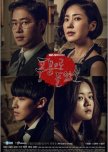
“No-one can make you feel inferior unless you give them permission.” (Eleanor Roosevelt)
If you are someone who can see through the facade to the merciless pen underneath, then you will love this drama. The writer, Jung Sung Joo, shares Jane Austen’s ability to allow characters to damn themselves through the words that emerge from their own mouths, and she reveals a feast of dangerous stupidity and ignorance, stuffed full of self importance, pompous delusion and total helplessness.The art of good satire is to clearly reveal the self interest and evil hidden behind the veil (such an apt anagram!) which the powerful draw over it. This show does that in spades. Hysterically funny at the start as it draws the lines of battle. Then it inches down the road to seriousness until, twisting the knife, the cost in suffering of the abuse of power is laid bare. However funny it is, this drama is a deeply serious comment on the use and abuse of power in a society in transition to the modern, and the underlying ruthless, self-interested principles that guide it.
The skill of the writer is so much more subtle than simply mocking and attacking. The script, in the wonderful hands of director Ahn Pan Seok, simultaneously unfolds multiple perspectives on a situation. Laughter and anger share the same space. One second judgemental, the next sympathetic towards the same character. The music (by Lee Nam Yeon) is a masterpiece of counterpoint and a character in itself, as is the suffocating environment of the house.
This biting satire on class and privilege may not make a great deal of sense to people from more notionally egalitarian societies without a history of aristocracy. The true aristocracy are not people who have wealth and power because they have made it on their own merit, or through business dealings or corruption, like the chaebol (who also feature in the story). Their wealth, power and status is totally unearned by them individually. They view it as their inalienable/natural birthright and that they are the custodians that must hand their power and values on, intact, to the next generation. Hence, Han Jung Ho’s bizarre insistence that the “children” study Machiavelli’s “The Prince” in scenes that made me cry with both laughter and despair.
Part of the humour and satire stems from the fact that the Han family is not truly aristocratic (the father is third generation nouveau riche) but they ape the values of the aristocracy. They do it with the clumsy, narrow-minded misunderstanding and thoroughness that only the aspiring can have, and in the process wreak devastating havoc on everyone else. The corrupted worship of tradition and ceremony may be ridiculous, but make no mistake, the power is real and dangerous.
The script plays on the blindness at the heart of the Han parents to the privilege that feeds their all consuming self interest. Having never known anything else they cannot think outside the box. In a wonderful moment in Ep 6, the father (Han Jung Ho) claims a spurious egalitarian credibility for himself by smugly announcing that everyone, whatever their status, shares the same style of office space in his law firm and adds, “what does being aristocratic count for these days, we’re all civilians now”. Their ignorance and ego offers much opportunity for manipulative, servile flattery which in writer Jung Sung Joo’s hands becomes a crowning work of art. Especially in the sycophantic performance of a lifetime by Kil Hae Yeon as Secretary Yang. My favourite line of hers being (in the context of imagined alopecia) “Don’t worry, Caesar didn’t have much hair either.” To which Han Jung Ho’s reply is, “Truly, you’re the only one who reads my mind.”
But behind the savagery of the satire lies a humanity that reveals how trapped the Han parents are in the vice-like grip of the world that they have created from their delusion of superiority and the personal price they are condemned to pay for continuing to uphold it.
As with the ending of Secret Love Affair, another exceptional offering by this writer and director combination, the ending is perfect. There is no trite papering over cracks, although I could have wanted the lead up to it to be better. Whoever ordered the cutting of the number of episodes late in the day is a philistine worthy of being employed at Hansong! Having said that, my only criticism is that overall the script could have done with an editor’s pencil. It is expansive in the extreme, and although it mostly holds the attention, it would have been tighter and sharper commissioned for 24 episodes, rather than the 30 it ended up being. The cast and direction are legendary and walk as close as humanly possible to the edge of the cliff without falling over.
As a piece of satire this is 20/10, but as a drama, it has a few pacing faults. I cannot recommend it enough if you are someone who likes to be challenged to think when watching. It is a superb piece of drama.
What my rating means: 9+ A drama I totally fell in love with and is endlessly re-watchable. It ticked all the boxes and had some serious wow factor. It would go on my personally recommended list.
Was this review helpful to you?
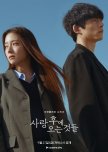
Muted, poetic, thoughtful
Although it is a Korean drama it has all the hallmarks of a Japanese production. The sombre moodiness and the underplayed emotion. The observation of thoughtful faces in a muted colour palette. The poetic rather than the pragmatic approach softens the tone so that it sits comfortably in melancholy. Any raw emotion is smoothed out by gentle music and there is no wailing going on. The OST was good, setting the tone for the drama.There is a thoughtful progression to the feelings that work their way through right to the end which has a gentle landing. It delivers what it promises in the title, “What Comes After Love” so don’t come into this thinking it’s a standard romance. The messages in the show resonated with me, and reflect the changing perspective of what love and relationship are/should be as we grow older. It is the journey the protagonists take as they learn to appreciate who they are and what is needed to sustain themselves and a relationship.
Overall the show is solid with good performances, believable chemistry and consistent quality in the production values. Although I enjoyed it very much, there was not that spark to lift it to something special. There were no new insights for me and the story played out in a safe and somewhat predictable way, taking no risks. Where it did do very well was to show the progression of emotions. The rating reflects the quality of the production overall, rather than the originality, which would have scored lower.
Was this review helpful to you?
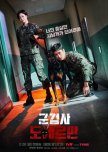
Too reliant on cheap tricks to really shine
If you want an easy laugh, an abundance of twists and don’t care too much about credibility or depth, this show may well suit you. But if you are looking for something more sophisticated, challenging and suspenseful it will disappoint.Okay let’s start with some of the good stuff before weighing in with the problems.
Such a cool sound track. I think this is my favourite soundtrack so far from all the dramas I’ve watched. The opening credits track really remind me of “The The”. The vocalist has a similar vocal style. Even the title font and colour felt like a graphic nod in that direction. Is this just me? Overall, the rest of the OST has got some great voices, with gritty undertones and pulsing instrumentals.
The military setting was a strong point, allowing for the investigation of a number of scenarios around the abuse of power and authority which offered a different slant from the more normal political or business environment. It examined some really good issues that had a lot of potential.
Do Bae Man was a quirky character well executed by Ahn Bo Hyun, although in the later stages I think he lacked subtlety. Jo Bo Ah as Cha Woo In also made a sound job of the action scenes. Oh Yeon Soo was less persuasive as their arch nemesis, Noh Hwa Young, for me she didn’t quite convince in the steely coldness that the role demanded. I thought that Kim Woo Seok gave the best performance as the damaged and unstable Noh Tae Nam and his screen time made for compulsive viewing.
This is a show of two halves. The first half is much lighter and quirkier than the second half. At first, there was a great mixture of the believable and the ridiculously unbelievable. I liked the way the writer managed to keep you clinging to the edge of credibility before tipping you over the edge. However, on a number of occasions, ridiculously unbelievable was not the writer’s intent and it really cast a shadow of stupidity and incompetence over the protagonists. That they would not properly protect vulnerable, mission-critical witnesses for instance. This is short-cut, sloppy plotting that requires manipulating the integrity of the characters. Of all writing faults, for me, this is the one that is absolutely unforgivable. Your characters are your connection to your audience, undermine them at your peril.
The one thing that this writer excels at is twists and there are some absolutely classic ones, along with a few oh-dear-whoops moments that completely cracked me up. The one at the end of Episode 7 was brilliant and showcased the vein of black humour running through this production.
However, a primary fault is its inability, particularly in the early stages to build sufficient tension. The blame can partially be laid at the door of cheap tricks to grab the attention, rather than systematically building suspense that carries the viewer with it. Particularly in the first half the writer allowed himself to get distracted by making a joke or trying to look cool, rather than making a point and again character integrity was compromised for the sake of a passing punchline.
Throughout there was all too frequent use of flash forwards and flash backs often at the start of an episode to try to peak interest. The fault might be laid at the writer’s door or maybe the director in the editing suite, but whoever did it the result is not persuasive. It’s a cheap way to get attention and smacks of covering up weak plot planning.
The mode of choice is to show the action and then tell the twist afterwards, as in a “gotcha”. This can be effective sometimes, but it is used too often here so that the viewer soon learns not to trust anything they are seeing. Instead of drawing the viewer in, it serves to alienate them, as though they are not part of the inner circle in the know. This technique is something to be used sparingly when it’s a huge twist that comes like a slap in the face. The cost for frequently using it is losing the building of suspense that the viewer does for themselves in anticipation of what might come.
Overall the plot lacked drive and coherence, jumping from scenario to scenario, with way too many plot threads. This meant that some of the serious issues aired in the second half of the drama were explored in less depth than they really deserved. Whereas more minor ones were left dangling for long periods only to be picked up again as a convenience. There was an awful lot to try and pack into the drama, a more in-depth exploration of either the corruption or the social issues would have made a full length drama and I felt that trying to do both meant that neither was fully done justice. The resulting shortage of time lead to a naive, fantasy land treatment of many of the complex issues, for instance, the development of a new weapon.
It’s a necessary skill for a writer to work out how to dump info without requiring the actors to do it for them in unrealistic and clumsy conversations. This is a skill not yet mastered by Yoon Hyun Ho and there are way too many pedestrian lines for the actors to say that slow the pace and muddy the credibility. Later on, there is a shortage of sophistication in the playing out of scenarios, including the legal ones, and the script is amateurish. That injuries on someone’s back from a beating could somehow be construed and accepted as self-harm is ludicrous.
The script was not helped by the lacklustre directing and the choices in the editing suite, which served only to disjoint further, rather than unify the disparate pieces of the plot.
The FL, Cha Woo In, says at the end of Episode 1 “A world where justice and truth have been reversed. Only from upside down can you see it properly.” Which has echoes of the twist in perspective of this writer’s previous offering, “Lawless Lawyer”. I like the sideways approach that he takes, he has good ideas and themes worthy to be explored, it’s just the execution of them that is sadly lacking.
What my rating means: 7+ A watchable drama, but nothing exceptional. Good enough to qualify for the race, but finished with the pack. The sort of thing that promises more than it delivers.
Was this review helpful to you?

Less would have been so much more…
The problem with trying to do too much is that you don’t do enough. There was not enough depth to really make this drama memorable. We were introduced to a number of relationships, all of which had promise, but none of which were fully explored. We were given the overall picture, but what totally draws you in and keeps you there long after the last episode, is not the obvious, but the small moments of unexpected revelation that can only happen when you spend time with characters.With so much going on there was not enough time to explore big transitions, let alone small ones. Some of the developments required by the plot, which were complex emotional transitions, were skipped through on a wing and a prayer. Worse, motivations were explained in retrospect with large chunks of repetition and telling rather than showing. This is such bad writing and the fault lies in a weak structure.
I don’t think that increasing the number of episodes would necessarily have helped. All of the character interactions had large amounts of emotional baggage, and if they had all been fully explored, it would simply have become too much. There’s only so much emotional pay-off that you can squeeze from story or from a viewer. When this has to be divided across too many characters it can get very thin, with the result that the viewer feels less all round intensity and therefore empathy.
I was not convinced of why there was a need to tell this story in two time-streams with two sets of loosely connected characters. The periods of time that were spent in each time-stream were frequently too long, which broke your connection to the other story-line. I couldn’t find a strong enough reason to think that it merited this treatment, they just seemed to run in parallel rather than intersecting with each other. Neither did one story enhance our understanding of the other, both seemed to say the same thing.
For this to be a special drama, and I think that the themes and concept had the potential to be so, the first half desperately needed to be pruned of some of its intensity around non-core relationships and to focus more on the central ones. As for the second half, the structural faults in the plot needed to be resolved. Maybe it’s just that I like clean lines and deep thoughts, but KISS is an aphorism for a reason folks!
Having said all that there were things to like about it too. The sombre colour palette with great lighting designs that provided highlights and supportive context for the action. The colours were rich and intense, particularly in the night scenes and the definition had a beautiful clarity to it. Some of the cinematography (enhanced by CGI) was breathtakingly beautiful, particularly at the beach.
The standard of acting from all four of the main cast was good, particularly from K and Cream although I think that the director took the melo too far in places. The characters themselves were interesting and varied although I wasn’t convinced by the character of Li Na, or Phoebe Yuan’s performance - she was no Elizabeth Taylor…
I didn’t find the OST that inspiring to be honest, which was a pity as it was set in the music industry and an opportunity was missed. But maybe I’m not that qualified to judge as I’m not a great fan of Asian music in general, which often sounds too smooth, bland and overproduced for my taste.
Overall, my interest waned as the episodes progressed and more and more flaws were revealed.
What my rating means: 6+ Some aspects of it were OK but it had serious flaws. It will pass the time but you can find something better.
Was this review helpful to you?

It is possible to have way too much of a good thing
There are a ton of reviews for this show, so I wasn’t going to add to them, but I feel frustrated enough to want to write one. I’ll try and make it short, in keeping with my critique!I loved how this show started. Great characters, clever interweaving of flashbacks, beautiful unfolding of relationship etc etc. But as a writer I got really frustrated watching this. There is a natural arc for any story that you write and it has an appropriate length that does it justice. The perfect length states your case and leaves a clear impression in the viewer’s mind that is just enough for them to want to hold it in their hand and gaze at it a while longer, hopefully realising things for themselves, that lead them deeper. In my mind, this is the joy of a story. Not just what is told, but where it leads you afterwards.
However, in order to realise that goal, a writer needs to do two things:
1) have the message precise in their mind;
2) write only enough to illustrate it clearly.
Mostly, too much information is written and the job of editing is the delight of tightening and sharpening and chipping away until that message shines like a cut diamond. When you have cut sufficient away for the brilliance to emerge, then you have found the natural length of your story.
But dramas are commissioned and given a length: write a story that fills 16 episodes. What happens when you need to expand the story to fill the space allotted? Your diamond gets cut to fit the setting and instead of being sparkling and sharp, it becomes cloudy and dull. The writer tried to expand the beauty that was there and in the process went round and around and around the same material until it was trampled underfoot in the endless circularity that was all the middle episodes, by which time I was barely interested enough to follow it through to its inevitable conclusion.
If this had been an 8 or even a 10 episode drama, it could have rated at 8, no trouble. There was stuff that was good. The dialogue, the performances of the leads in particular, the sets, the cinematography, the drawings featured in the show... But sadly, it just has to be a flawed 6.5 for me.
What my rating means: 6+ Some aspects of it were OK but it had serious flaws. It will pass the time but you can find something better.
Was this review helpful to you?
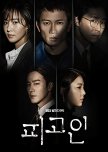
Hacked away its own feet
However hard great actors try, and you’ve got to admit, Ji Sung is pretty damn good, they can’t quite hide appalling writing. Rather like an oyster creating a pearl from irritating grit, however magnificent, the grit is still there in the middle. This show is full of good actors (with one or two exceptions) wrapping up grit with varying degrees of success.Cudos also has to go to the director for trying to help in the process by toning down some scenes which could have really got out of hand. But the banal and unintelligent writing drags them all down, again and again. The lines are often so pedestrian and obvious and either do absolutely nothing to reveal the interior emotions and insights of a character or, even worse, vocalise feelings in totally weird and unnatural ways. Stating the obvious is the go-to choice for imparting information and there are plenty of scenes where some of the antagonists behave more like naughty boys rather than credible, disturbed, human beings.
Then there are a whole slew of unfathomable motivations which have to be verbally “explained”, any number of clunky and repetitive plot devices aided and abetted by bad editing choices, an ever growing list of eye-rolling coincidences, an abundance of unbelievable twists and a complete abandonment of any sort of credible legal procedure. There was plenty of tension but the pacing just got slower and slower making it hard going through the middle and it really didn’t need two extra episodes.
The vagaries of memory loss seem to follow no rhyme nor reason. That memories are buried and hidden is something I have personal experience of, but the writer’s use of it coming and going just to serve the plot smacks of total convenience rather than reality. Further, the slow revealing of the crime doesn’t reflect recovered memories, adding to the sense of manipulation rather than suspense.
The actors have to do all the heavy lifting themselves, with body language, facial expression and tone and Ji Sung is the shining light here with a wonderful pearl of a performance that is the one good reason to keep going. His relationship with his daughter was very real and Shin Rin Ah also put in a great performance. Unfortunately though, Uhm Ki Joon and some of the supporting cast are only able to manage mis-shapen lumps of calcium carbonate with their parts.
The cinematographer created ambiance by the bucketload with the use of highlights and shadows. The scenes inside the prison were lit to perfection, utilising low levels to create an atmospheric, metallic, industrial feel in mainly soft golds and blues. There was also imaginative and meaningful use of the shadows cast by window bars and rectangular slabs of light offered by slots in doors. I also loved the opening credits sequence with its overlaid images and washes of blues and golds, picking up on the overall theme.
In the hands of a good writer this could have been a superb drama, because the basic ideas, acting talent and the production values are up there. But instead, all of that is undermined by weak dialogue and unconvincing plot execution, and I was left with a drama that I struggled through rather than enjoyed. In fact, I simply couldn’t get to the end and that’s saying something because when I commit to writing a review I finish the drama. So apologies, but I really can’t see anything salvaging this one!
Was this review helpful to you?

A wonderful unfolding of layered characters.
I’m wrapped up in a comfort blanket eating too much 70% chocolate, a surfeit of endorphins and caffeine. Netflix has offered two outstanding slice of life dramas and aired them simultaneously. First, “My Liberation Notes” and now “Our Blues”. What more could be asked for? Whereas “My Liberation Notes” was essentially a story built around family, “Our Blues” centres around the members of a community and explores their individual lives and circumstances. Given the title, there is a hint that this drama will tackle the things in life that are difficult. But far from being sad it ultimately strikes an uplifting note.The stories on offer are not about huge life changing tragedy but the emotional hurdles that life puts up for us to jump over and the hoops we go through. Essentially this is a drama about the good heart that lies at the centre of ordinary human beings. Their generosity, warmth, caring and insecurities.
They are stories set within a community where there is no real privacy and no anonymity. Where caring and interference exist either side of a blurred boundary which is crossed and crossed again. They are essentially about the price individuals are wiling to pay for deeper connection and love, and the confused and contradictory emotions that are experienced when that love and resentment collide.
There is no judgement written into the narrative. Each character has depth, we can love them from one angle and criticise them from another.
Among a slew of excellent performances Lee Byung Hun as Lee Dong Seok was the standout. Even though the writing for the last three episodes concerning his relationship with his mother, did not work as well for me, his performance did not falter.
Next in line was Han Ji Min, who was painfully convincing as the conflicted and hurting Lee Young Ok. Also, Lee Jung Eun as Jung Eun Hee, the stalwart glue of the community. But to be honest there was barely a weak performance in a large cast. Perhaps Shin Min Ah failed to completely convince me as Min Seon Ah, but she came good in the end.
This is the sixth writer (Noh Hee Kyung) /director (KimKyu Tae) collaboration which started in 2008. They include “Live”, “That Winter, The Wind Blows” and “It’s Okay That’s Love”. The long experience of working together brings a sense of seamless harmony and easy expression to the end result. In a drama of so many parts there can sometimes be an unevenness of tone, but here the actors were helped to bring a consistent feel that unified the whole production.
One of the most challenging things to write is the slow unfolding of emotions for a character. Peeling back the disparate layers to find out what is underneath. To reveal the unexpected, that often surprises us. This writer has done a magnificent job of just that, particularly with the story of the twin sisters which explores deeply complex and conflicting emotions and reveals them beautifully.
The cinematography is simple and what I loved about this show was the relief from artificially beautified faces. People were shown in their ordinariness with limited makeup and occasionally, deliberately unflattering lighting. In terms of camerawork, it was Jeju Island itself that became the star of the show with all its natural beauty on display.
The music was a weak point for me, with too much use of hotel-lobby style background music that failed to do justice to the emotional depth of the action. Thankfully, there were times when silence carried the pathos and did justice to the acting.
This drama comes highly recommended.
What my rating means: 8+ A great drama with interesting content and good writing, direction, acting, OST, cinematography. But didn’t quite have the requisite sparkle to bump it into my all-time fave list. Worth watching.
Was this review helpful to you?
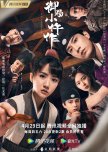
All plot and no character dulls the edge of this drama
This has a great deal going for it in the plot department. You can tell when a drama is an adaptation of a good book, because beautiful, twisted plots like this take a long time to create, far longer than the normal scriptwriter can afford. Believe me I know, I’ve written them and this one is more intricate than mine. It binds together a rainbow of strands to make a very colourful and complex tapestry, leaving no straggly ends fraying at the edges. This is its outstanding strength and also its dramatic weakness.In a book, you can take your time to unfold the details and mix them in with a range of emotional and descriptive threads and varied dialogue. But when you make a drama out of it, what you are in danger of doing is simply using the characters to explain the plot, so that you lurch from one explainy description to another. Particularly when you don’t have the budget to flesh it out with action scenes and speccie fights. And unfortunately, that’s what happened here.
The cost was two dimensional characters standing around telling each other what just happened and what the motives of the protagonists were, leaving no time to really develop their relationships. As a result the romance was very tepid and sparse, so don’t go into this expecting fizzing fireworks, it’s definitely damp squibs in the chemistry department. I found Su Xiao Tong’s characterisation of Chu Chu really lacked credibility and strength making her a very soft and ineffectual heroine. She acted as though her early life had been easy and privileged rather than the tough experience portrayed in the drama.
The highlight though was the mesmerisingly delicious performance by Mu Hai Hu as the grand eunuch Qin Luan. I loved his obsequious malignancy and his high pitched whining voice. A real standout performance.
It kept me interested up to about half way through, but after that it started to become very heavy going.
Was this review helpful to you?
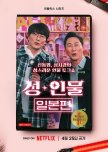
Nothing new, but a good place to start
I decided to watch this series because I wanted to understand more about what drives the gender dynamics that I sometimes find quite confronting in Japanese romance dramas. It was only the last episode that began to address that question for me when the hosts chatted with four Japanese people who didn’t have a direct connection to the adult entertainment industry about societal expectations and couple dynamics. I can't say it helped greatly, but it did give me a bit of insight into why Japanese men in these dramas sometimes take the initiative in a forceful way.The first five episodes concentrated on exploring different aspects of the sex industry with the exception of sex workers. If you have watched any documentaries about this topic, or participated in the activities it covers, it is unlikely that you will learn anything new here. But for those who have no knowledge it will serve as a good introduction.
The tone of the series was to break through embarrassment and talk directly about what was on offer. The participants all displayed a professional dignity which created an atmosphere of easiness in which direct questions could be asked and answered openly and frankly. Sung Shin Kyung in particular did a good job of hosting and hit the right note in both his manners and his general demeanour to ease conversations and interactions.
Unfortunately, it did still include the Korean variety show habit of extensive use of overlaid squiggles and emoticons, but if you grit your teeth you can get past them.
What my rating means: 7+ A watchable drama, but nothing exceptional. Good enough to qualify for the race, but finished with the pack. The sort of thing that promises more than it delivers.
Was this review helpful to you?
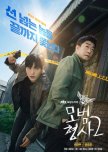
From the sauna to the ice bath and back
Whether you enjoy this drama or not is probably more about your expectations going into it, than the drama itself. It’s not an emotional roller-coaster of a thriller but rather a piece that is two thirds cerebral chess and one third comedic camaraderie. They make strange bedfellows and perhaps attract different types of audience hence my comment about prior expectations.The plot concerning the standard chaebol rivalries is a complete contrast to the fun-filled dynamics of Violent Crime Team 2 and sometimes the constant shifting is like plunging from the sauna into the ice-bath. (I did that once and thought I was having a heart attack!)
Let’s deal with the cerebral chess first. Although complexity is good, too much complexity can interfere with the flow and pace of the drama. It gets a bit tangled up with itself and there are a lot scenes that use a lot of names to explain the intricacies of who knows what about who said what about who threatened who because of what was done about what who ordered…
There is a balance to be struck by the writer when constructing the plot and here I think the tendency to keep explaining is counterproductive as it breaks the both the tension/suspense and the flow of the viewer’s emotional connections to the characters and story. I wasn’t totally convinced that it was necessary and at times things felt a bit repetitive. The downside of not explaining is that the viewer sometimes get lost but it allows you to keep up the pace and tension. I think this was done very effectively in “Insider” where an equally (if not more) complex plot swept along and carried you with it.
As the drama progresses it gets bogged down in the nitty gritty and where it is going has been obvious for a while, with the result that it becomes somewhat tedious and struggles in the last half to capture interest. This is partly because it is rooted in a slice of life approach that sort-of abides by the rules of investigation which slows everything down and keeps it grounded. It also emphasises dialogue over action and there are too many static scenes of people sitting around on chairs and talking.
Having plunged into the ice bath let’s go back to the sauna, and what a fantastic sauna it is. Especially in the first half the camaraderie of Violent Crime Team 2 is a total delight. It’s wonderfully funny and so warm. All of the detectives have distinct personalities and are given opportunities to shine. It totally enlivens the first half of the drama and makes it such a enjoyable watch. If it ended half way through the drama would definitely be a higher rating.
Along with the performances by the detectives, the standout for me was Jung Moon Sung as Woo Tae Ho. I was really riveted by his performance and he totally convinced me that he was a man surrounded on all sides with only his wits to aid him to survive. And lastly, just a nod to casting for actually finding someone (Jasper Cho) who can speak English convincingly, even though his accent is Canadian not American, but we’ll forgive that - nothing’s perfect…
What my rating means: 7+ A watchable drama, but nothing exceptional. Good enough to qualify for the race, but finished with the pack. The sort of thing that promises more than it delivers.
Was this review helpful to you?


 3
3 2
2
















